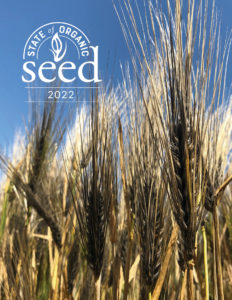
OSA is proud to announce the release of our most recent State of Organic Seed report.
State of Organic Seed is an ongoing project to monitor organic seed systems in the U.S. More than ever, organic seed is viewed as the foundation of organic integrity and an essential component to furthering the principles underpinning the organic movement. Every five years, SOS serves as a progress report and action plan for increasing the organic seed supply while fostering seed grower networks and policies that aim to decentralize power and ownership in seed systems.
In 2019, the Organic Farming Research Foundation (OFRF) and OSA were jointly awarded funding from the U.S. Department of Agriculture’s (USDA) National Institute of Food and Agriculture’s (NIFA) Organic Research and Extension Initiative (OREI) for the National Organic Research Agenda (also released today!) and SOS projects. The following year, OFRF and OSA launched a national survey of organic farmers and ranchers, in addition to a survey targeting transitioning-to-organic operations, to better understand these producers’ challenges, needs, and perspectives. More than 1,100 producers responded to the survey and an additional 100 producers attended 16 listening sessions across the country.
The SOS report released today includes substantially more data than our 2016 report, including a deeper examination of organic seed producer/company challenges and their networks. This and other data can be explored through an interactive website where users can sort five data sets by region, crop type, and other identifiers. See: https://organicseed.shinyapps.io/SOSData/.
Organic farmers produce food differently, and that means they need different seed for the crops they grow – seed developed to thrive without synthetic chemical fertilizers and pesticides, and adapted to their local climate and soil conditions. Organic seed is also a regulatory requirement. The USDA’s National Organic Program requires the use of organic seed when commercially available.
Unfortunately, OSA’s recent findings show no meaningful improvement in organic producers using more organic seed compared to five years ago. This lack of progress puts at risk the viability of the organic seed industry and the integrity of the organic label. In particular, the largest organic operations still use relatively little organic seed, and data suggests that organic certifiers’ enforcement of the organic seed requirement could be strengthened.
However, OSA’s data points to progress in other areas, including public investments going toward organic plant breeding and other organic seed research initiatives. More than $39 billion have been invested in these types of projects in the last five years alone. This represents the largest public investment in organic seed systems that OSA has ever recorded. More organic plant breeders are having success releasing new varieties as well.
“The findings are clear, and they underscore the urgent need to modernize organic seed policy, support the success of existing and new seed producers, and confront the dire risks climate change poses to our seed supply,” says OSA’s Kiki Hubbard, lead author of the report.
The report is available online at: www.stateoforganicseed.org/.
2022 State of Organic Seed Webinar
On May 17th, OSA and eOrganic hosted a webinar on the 2022 report – the recording is below. In this webinar, OSA’s Kiki Hubbard and Jared Zystro share the report’s findings and recommendations, which are informed by numerous surveys and data sets. Webinar topics include:
- Trends in how much organic seed is being planted in the U.S.
- Barriers to growing the organic seed supply
- Challenges in enforcing the organic seed regulation
- Organic seed production challenges and needs
- Organic seed producer networks
- Investments in organic plant breeding and organic seed research
- Perspectives on intellectual property rights (IPR)
- Perspectives on climate change
- Organic seed policy solutions
Special thanks to the USDA’s National Institute of Food and Agriculture for awarding Organic Farming Research Foundation (OFRF) and OSA an Organic Agriculture Research and Extension Initiative (OREI) grant to support our respective reports: the National Organic Research Agenda (NORA) and the State of Organic Seed (SOS).
